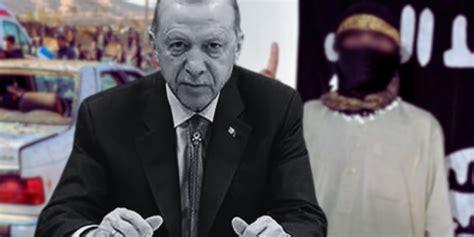
Allegations link ISIS Kerman bombers to Turkey
In the wake of a recent Islamic State (ISIS) bombing in the Iranian city of Kerman, a web of allegations emerged pointing to Turkey’s involvement in the attack.
The attack, which killed over 90 people and is now considered the deadliest in Iran since the 1979 Islamic Revolution, took place on 3 January at a cemetery commemorating the fourth anniversary of the death of Islamic Revolutionary Guard Corps (IRGC) commander Qasem Soleimani. Soleimani was killed in a US drone strike at Baghdad airport in 2020. ISIS claimed responsibility.
Turkish links uncovered
The Kurdistan Strategic Research Centre (lekolin.org), citing “reliable sources” in the Kerman region, reported that Hissên Ebid Xıdır Ebdileziz El Xişêş, also known as Abu Herb, was one of the suicide bombers who carried out the attack, and was reportedly in Turkey prior to 3 January.
The website lekolin.org provided further details about the alleged bomber, claiming that Abu Herb, who was born in the Nineveh region of Iraq, allegedly underwent military training in Turkey following the recapture of Mosul from ISIS by Iraqi forces in 2017. He is believed to have played a key role in organising the Kerman attack and overseeing the training of ISIS fighters in Turkey.
The report claims that local security forces in both countries exchanged warnings about the transit of ISIS members from Turkey to Iran.
Timing
The timing of the twin blasts, the day before Iranian President Ebrahim Raisi was scheduled to visit Ankara, adds a layer of complexity. Sources suggest that these warnings reached the Iranian president’s office, leading to the cancellation of the visit.
Turkish President Recep Tayyip Erdoğan’s communications directorate said in a message on X, formerly Twitter, that Erdoğan and Raisi had spoken on the phone on Wednesday and agreed to postpone Raisi’s visit to Turkey to a later date.
Iranian response
Meanwhile, Iranian authorities have reported a successful raid on a cell allegedly linked to the attack, resulting in the death of two people and the arrest of two others.
Among those arrested is Muhammed Imran Tanvir, known as ‘Abu Imran’, an alleged ISIS leader and a skilled bomb maker. Tanvir is said to be a relative of Abdullah Taciki, the probable mastermind of the Kerman attack, who allegedly entered Iran via Turkey. Another individual, identified as ‘Mehtab’, was arrested after entering the country disguised as a labourer.
The Iranian authorities’ statement also mentioned the ongoing search for Muhammad Adel Aref, known as ‘Adel Panjshiri’, another alleged ISIS leader, with intelligence placing him in an area west of Tehran.
Tajik national as prime suspect
Iran’s state news agency had printed a statement from the Intelligence Ministry eight days after the attack, saying the main suspect in planning the Kerman attack was a Tajik national known by his alias Abdollah Tajiki.
It said Tajiki had entered the country illegally on 19 December, and with a woman and a child as a cover had moved to a rental on the outskirts of Kerman. Tajiki is also believed to have been instrumental in the planning of the deadly attack and in the manufacture of the home-made explosives used in the bombings. He reportedly left the country two days before the attack after making the bombs.
Iran later officially identified the man as Bazirov Israeli son of Amanullah, a 24-year-old citizen of Tajikistan. It said Bazirov was trained in Afghanistan and sent to Iran from the Turkish border to carry out the attack.
Geopolitical accusations
Accusations of Turkish involvement in the Kerman attack have not been limited to reports based on Iranian sources. Cemil Bayık, co-chair of the Kurdistan Communities Union (KCK), claimed in a recent interview that the Turkish National Intelligence Organisation was behind the explosion. Bayık suggested that the attack was a move by Turkey to draw Iran into a war against the Kurdistan Workers’ Party (PKK) and the Kurds.
Bayık further claimed that the timing of the attack was aimed at influencing the talks between Erdoğan and Raisi.
In an earlier statement released after the attack, the KCK’s Executive Council had directly blamed the Turkish government under Erdoğan for the bombing, arguing that it was a deliberate move to provoke tension in the region.
The statement outlined a broader perspective, suggesting that the attack in Kerman was not only aimed at targeting the Iranian people, but was part of a larger plan to escalate conflicts in the Middle East. The Executive Council claimed that the real instigators behind the attack were the same forces that had previously supported ISIS, against which the Kurdish movement had successfully fought in the past.
The KCK stressed that the Turkish government under Erdoğan has not only facilitated ISIS attacks against Kurds and other peoples in the Middle East in the past, but also continues to support and direct the terrorist group for its own purposes today.
Turkey’s alleged ISIS hub
Further complicating the situation, the Istanbul Public Prosecutor’s Office has reportedly uncovered an indictment exposing ISIS activities in Turkey. According to a detailed report by Hale Gönültaş of Artı Gerçek, Turkey serves as a key hub for ISIS, facilitating recruitment, coordination and planning of attacks.
The indictment highlights the use of false passports, with fighters arriving in Turkey, changing passports and obtaining false Afghan identities before travelling to Afghanistan. The ISIS network in Istanbul is also allegedly linked to failed attacks in Europe.
As the intricate web of connections unfolds, the region faces heightened tensions, raising concerns about the potential involvement of external actors in destabilising the already fragile balance in the Middle East.
Source » medyanews.net





